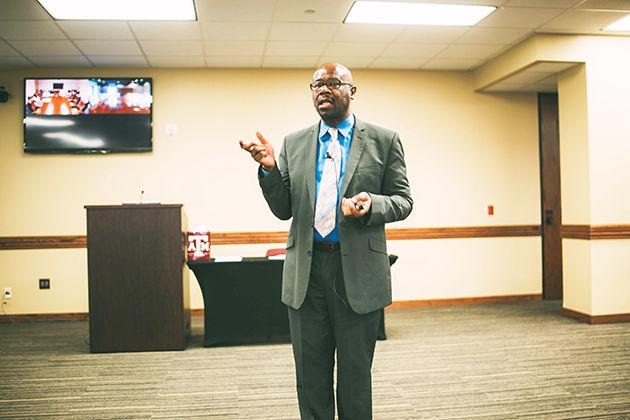Dr. Darin Latimore gave a presentation on Thursday entitled “Stereotype Threat, One Health and Their Implications for Transforming Healthcare,” which addressed the many negative effects imposed on minorities wanting to pursue a career in healthcare.
Latimore, who is the associate dean for student and resident diversity at the University of California Davis School of Medicine, identified African Americans, Latinos and Native Americans as the under-represented groups in healthcare during his talk. He also presented research that showed how negative racial stereotypes impact the performance of minority students.
A survey passed out at the beginning of the seminar instructed the audience to rate 17 statements on a scale of strongly agree to strongly disagree. The statements included, “When walking around school, I see images or facilities that represent me,” and “I believe that anxiety about how others perceive my ability has negatively affected my ability.” After the audience was finished, Latimore went through each statement one by one.
Latimore discussed the “Imposter Syndrome,” a complex where someone doubts whether they are qualified for a position they’re in or whether they should have been accepted to the school they’re attending. He described students in the past coming to his office hours trembling with anxiety about classes they were anxious about taking in the future, and the self-doubt he’s seen in his students. These traits are exemplified among minority students, and this can lead them to stop pursuing positions in the field of health care.
“Dr. Darin Latimore’s research presentation on stereotype threat and its impact on the health professions is a constant reminder that inequities, micro aggressions and macro aggressions exist in our educational systems, society, and the world,” Christine Stanley, Vice President and Associate Provost for Diversity said. “To be socially, globally and culturally competent require deeper dialogues in as well as outside the classroom for perspective taking, so we can be better informed learners, educators, and citizens.”
Latimore cited several studies, including a few survey studies conducted by himself and his colleagues at the University of California, Davis. One of the studies tested the difference between calling a test “challenging” versus “a test of intelligence.” Just that difference of wording alone made a significant difference in the test scores of the participants. Minorities who were told that they were taking an intelligence test did far worse, which Latimore’s team concluded was the result of negative stereotypes about intelligence that had caused them to under perform.
“This opened my eyes, this helped me to find new strategies to eliminate stereotypes,” Peter Pham, psychology sophomore said. “Going to seminars like these do help me open my eyes and try to eliminate negative stereotypes that the world has given us. Coming in, I did have a good idea of what [negative stereotype theory] was, but this was more in depth, it expanded my knowledge on stereotype threat.”
At the end of the lecture, Latimore gave a few examples of strategies that can be used to combat negative racial stereotypes, like reinforcing the idea that people are not born with a finite amount of intelligence, and that there is no limit to learning.
“One thing I want [educators] to take away from this, is if you do have a student that is not doing good academically, look at if negative stereotype threat and imposter syndrome are playing a role,” Latimore said. “Don’t just make the assumption that they’re not interested, they’re not an intelligent student, but look at some other reasons as to why they may not be doing well.”
Lecture exposes lack of diversity in healthcare
October 8, 2015
0
Donate to The Battalion
Your donation will support the student journalists of Texas A&M University - College Station. Your contribution will allow us to purchase equipment and cover our annual website hosting costs.
More to Discover









